新概念英语第二册第七课教案教学提纲
新概念2lesson7教案
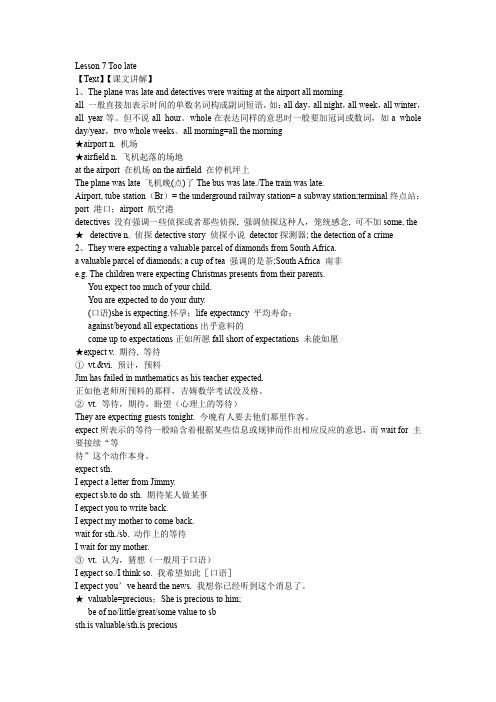
Lesson 7 Too late【Text】【课文讲解】1、The plane was late and detectives were waiting at the airport all morning.all 一般直接加表示时间的单数名词构成副词短语,如:all day,all night,all week,all winter,all year等。
但不说all hour。
whole在表达同样的意思时一般要加冠词或数词,如a whole day/year,two whole weeks。
all morning=all the morning★airport n. 机场★airfield n. 飞机起落的场地at the airport 在机场on the airfield 在停机坪上The plane was late 飞机晚(点)了The bus was late./The train was late.Airport, tube station(Br)= the underground railway station= a subway station;terminal终点站;port 港口;airport 航空港detectives 没有强调一些侦探或者那些侦探, 强调侦探这种人,笼统感念, 可不加some, the ★detective n. 侦探detective story 侦探小说detector探测器; the detection of a crime2、They were expecting a valuable parcel of diamonds from South Africa.a valuable parcel of diamonds; a cup of tea 强调的是茶;South Africa 南非e.g. The children were expecting Christmas presents from their parents.You expect too much of your child.You are expected to do your duty.(口语)she is expecting.怀孕;life expectancy 平均寿命;against/beyond all expectations出乎意料的come up to expectations正如所愿fall short of expectations 未能如愿★expect v. 期待, 等待①vt.&vi. 预计,预料Jim has failed in mathematics as his teacher expected.正如他老师所预料的那样,吉姆数学考试没及格。
新概念英语第二册教学大纲

新概念英语第二册教学大纲小组成员:陈烁郭晓双樊凡耿琳马维嘉姜久鑫一.适用专业英语公共课二.适合学生系统学习语法的高一年级学生。
三.教学目的学习分析句子结构,提高阅读理解能力,活学活用英语中级语法,掌握1500至4000个单词。
四.教学目标(1)尽快使教师了解新的教学材料,学习和探索新的教学方法和手段,教材的使用要尽量做到具有趣味性、艺术性、科学性和创造性。
根据录音朗读课文,掌握基本语法以及短语、词汇的用法,完成教材要求的课后练习,要求学生在课堂上踊跃发言,留出机会纠正错误,有助于提高口语水平,安排阶段学习。
(2)教学组织和课堂安排灵活,做到短时间、高频率、保证教师多次接触英语和足够的实践量。
在课堂开展两人小组、多人小组形式的活动。
充分地参与课堂讨论,体现出语言的交际性,实现师生之间的互动性。
五.教学内容(1)语法第一课时:Lesson1&Lesson2知识点1. 基本语法时态知识点2. 三大句型转换(陈述句、感叹句、疑问句)第二课时:Lesson3&Lesson4知识点1. 一般过去式知识点2. 现在完成时知识点3. 动词规则变化及动词不规则变化表第三课时:Lesson5&Lesson6知识点1. 一般过去时与现在完成时的差异知识点2. 冠词与限定词第四课时:Lesson7&Lesson8知识点1.过去进行时与连词(when,while)知识点2. 形容词与副词的比较级和最高级第五课时:Lesson9&Lesson10知识点1. 表示时间的介词知识点2. 被动语态第六课时:Lesson1-10综合复习1注意点1. 综合复习1-10出现的语法知识点注意点2. 通过测试卷进行综合测试,查漏补缺第七课时:Lesson11&Lesson12知识点1. 复习前6课的语法,知识点2. 学习一般将来时第八课时:Lesson13&Lesson14知识点1. 将来进行时知识点2. 过去完成时第九课时:Lesson15&Lesson16知识点1. 间接引语知识点2. 条件从句第十课时:Lesson17&Lesson18知识点1. 情态动词 MUST知识点2. 助动词/动词HAVE第十一课时:Lesson19&Lesson20知识点1. 情态动词CAN MAY知识点2. 动名词解析第十二课时:Lesson11-20综合复习注意点1. 综合复习11-20出现的语法知识点注意点2. 通过测试卷进行综合测试,查漏补缺第十三课时:Lesson21&Lesson22知识点1. 各种时态的被动语态知识点2. 常见动词搭配的介词第十四课时:Lesson23&Lesson24知识点: 复习前二十二的语法及难点部分第十五课时:Lesson25&Lesson26知识点1. 并列句知识点2.常见连词第十六课时:Lesson27&Lesson28知识点1. 一般过去时知识点2. 现在完成时精讲知识点3. 从句中的关系代词第十七课时:Lesson29&30知识点1. 对比一般过去时和现在完成时知识点2.定冠词与各种限定词第十八课时:总复习1-30(2)课程内容a介绍故事教师用几句话介绍课文,这样学生就能清楚课文中发生的是什么事情,而不需要去猜测。
新概念2第7课教案
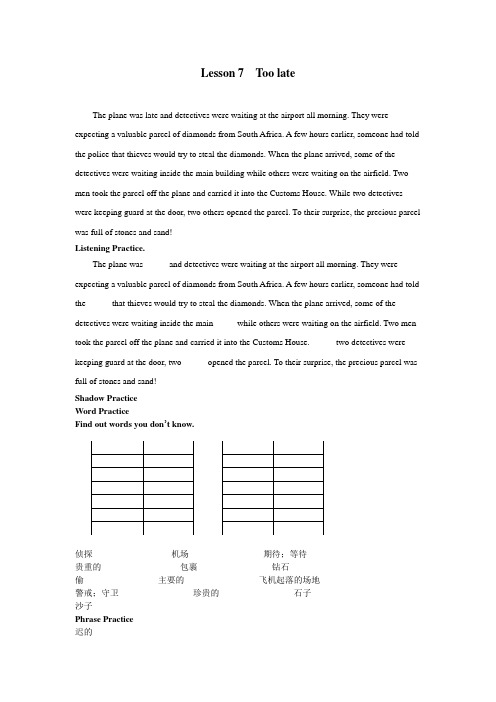
Lesson 7 Too lateThe plane was late and detectives were waiting at the airport all morning. They wereexpecting a valuable parcel of diamonds from South Africa. A few hours earlier, someone had told the police that thieves would try to steal the diamonds. When the plane arrived, some of the detectives were waiting inside the main building while others were waiting on the airfield. Two men took the parcel off the plane and carried it into the Customs House. While two detectives were keeping guard at the door, two others opened the parcel. To their surprise, the precious parcel was full of stones and sand!Listening Practice.The plane was _____ and detectives were waiting at the airport all morning. They were expecting a valuable parcel of diamonds from South Africa. A few hours earlier, someone had told the _____ that thieves would try to steal the diamonds. When the plane arrived, some of the detectives were waiting inside the main _____while others were waiting on the airfield. Two men took the parcel off the plane and carried it into the Customs House. _____ two detectives were keeping guard at the door, two _____ opened the parcel. To their surprise, the precious parcel was full of stones and sand!Shadow PracticeWord PracticeFind out words you don ’t know.侦探__________________机场_________________期待;等待__________________ 贵重的__________________包裹_________________钻石_________________偷_________________主要的_________________飞机起落的场地_________________ 警戒;守卫_________________珍贵的_________________石子_________________ 沙子_________________Phrase Practice迟的___________________________在机场___________________________整个早上___________________________一包钻石___________________________南非_________________________几个小时前___________________________告诉警察___________________________尽力做某事_______________________偷钻石___________________________一些侦探___________________________在主楼内_______________________在停机坪上_______________________海关_______________________保持警卫_______________________打开包裹_______________________令某人吃惊的是_______________________充满_______________________Sentence PracticeTranslate the sentences.飞机误点了,侦探们在机场等了整整一个上午。
新概念英语第二册第7课-完整讲解学习

valueless adj. 没有价值, 不足道的
It is a valueless book for me.
ห้องสมุดไป่ตู้worthless adj. 没有价值的
Was I really worthless to him?
precious, valuable, invaluable, valueless priceless, worthless
expensive adj. 价格昂贵的
-less 表否定:
=invaluable
priceless adj. 没有价格的, 无价的
Things such as love, family, genuine companionship, dignity, honor, and life are priceless.
• steal stole
• steal sth. • steal sth. from sb. •偷钻石 steal the diamonds
stolen
•小偷们将试图偷走钻石 That thieves would try to steal the diamonds. He has stolen away Mary’s heart. He stole into the room. vi. 偷偷地行动,悄悄靠近
钻石婚 diamond wedding
金婚 golden wedding
银婚 silver wedding
纸婚 paper wedding
60 anniversary 50 anniversary 25 anniversary 1 anniversary
main adj. 主要的 main building main street main sentence main idea main不能与人连用
新概念英语第二册第七课教案

§Lesson 7 Too late 为时太晚【New words and expressions】生词和短语★detective n. 侦探detective story 侦探小说★airport n. 机场★airfield n. 飞机起落的场地port 港口; airport航空港field 田野; airfield 停机坪at the airporton the airfield★expect v. 期待, 等待except (prep)除……之外expect/ik'spekt/ v. 期待, 等待I think so.I expect so.我希望如此[口语]expect sb.to do sth.期待某人做某事expect sth.及物动词: I expect your letter.I expect you to write back.wait for sth./wait for sb.不及物动词expect:心理上的等待wait for:动作上的等待I wait for my mother.I expect my mother to come back.★valuable adj. 贵重的★precious adj. 珍贵的value n.v ---valuable adj.有价值的sth.is valuable/sth.is preciousprecious 带有感情色彩的precious photo 珍贵的照片price 价格; priceless adj.-less 表否定; 没有价格的, 无价的valueless adj. 没有价值, 不足道的worth 值: worthless adj. 无价值的★parcel n. 包裹★diamond n. 钻石precious stone 宝石crystal 水晶; jade 玉diamond ring 钻石戒指★steal v. 偷steal,stole,stolensteal sth. 偷(某物)rob sb. 抢(某人)My wallet was stolen.I was robbed.rob the bank 与地点相连的偷抢都用rob+地点★main adj. 主要的main building; main streetmain sentence; main idea但不能与人连用★guard n. 警戒, 守卫life guard 救生员/body guard 保镖★stone n. 石子★sand n. 沙子本课重点: 过去进行时, 一般过去时一般过去时与现在完成时共同点: 动作在过去都做过了.区别: 过去式只能强调过去的事, 和现在没有任何关系.I ate a piece of bread.现在完成时, 过去的事情对现在产生的影响.I have eaten a piece of bread this morning.I'm not hungry.The clock stopped.陈述事实The clock has stopped.过去的事实对现在造成影响It snowed yesterday.It has snowed yesterday.强调对现在造成影响【Text】Lesson 7 Too late 为时太晚First listen and then answer the question. 听录音, 然后回答以下问题.Did the detectives save the diamonds?The plane was late and detectives were waiting at the airport all morning. They were expecting a valuable parcel of diamonds from South Africa. A few hours earlier, someone had told the police that thieves would try to steal the diamonds. When the plane arrived, some of the detectives were waiting inside the main building while others were waiting on the airfield. Two men took the parcel off the plane and carried it into the Customs House. While two detectives were keeping guard at the door, two others opened the parcel. To their surprise, the precious parcel was full of stones and sand!参考译文飞机误点了, 侦探们在机场等了整整一上午. 他们正期待从南非来的一个装着钻石的贵重包裹. 数小时以前, 有人向警方报告, 说有人企图偷走这些钻石. 当飞机到达时, 一些侦探等候在主楼内, 另一些侦探则守候在停机坪上. 有两个人把包裹拿下飞机, 进了海关. 这时两个侦探把住门口, 另外两个侦探打开了包裹. 令他们吃惊的是, 那珍贵的包裹里面装的全是石头和沙子!【课文讲解】all morning=all the morningThe plane was late 飞机晚(点)了The bus was late./The train was late.detectives 没有强调一些侦探或者那些侦探, 强调侦探这种人笼统感念, 可不加some,the....were waiting... 故事背景, 用进行时态They were expecting...期待着心理上的等They were waiting for...a valuable parcel of diamondsa cup of tea 强调的是茶South Africa 南非a few hours earlier 几个小时以前a few hours before/a few hours agosomeone had told...过去完成时, 过去以前发生的事情...that thieves would try to...would+do 过去将来时,间接方式, 转述, 站在过去看未来that 从句.典型的宾语从句, 起转述作用steal sth.one...the other.../some...others...others=other+名词复数...the plane arrived,...were waiting inside the main buildingwhile others were waiting on...when; while 当……时候while能用when代替; 但是when却不一定能用while代替.while+从句, 动作一定会延续when+延续性动词/瞬间动词; when he arrivedwhen he diedwhen,while强调动作同时发生过去进行时:在过去的某一点时间, 或者是过去某一动作同时发生的另外一个动作瞬间动词(arrive)无进行时态I am arriving 进行时态表示将要When he arrived,I was having dinner.同时发生的两个动作, 均用过去进行时When I was doing my homework,my mother was cooking.When my mother was doing the housework,my father was watching TV.同时发生的两个动作1.一个用一般过去时, 另一个用过去进行时2.分工的情况, 均用过去进行时When the plane arrived,...were waiting inside the main buildingwhile others were waiting on...Two men took the parcel off...take sth.off...=take sth.away from...and carried it into...carried 表示看得很重Customs House 海关While......were keeping guard at the door,two others opened the parcel.表面上是分工, 两个动作同时发生, 不是同时开始同时结束, 延续时间不一致,长一点时间的动作用进行时态, 短时间的动作用过去时.When someone knocked at the door,I was having dinner.keep guard 守卫; at the door 在门边(固定搭配)two others=two other detectivesTo their surpriseto one's surprise,让某人惊讶的是To my surprise,the teacher was late.To one’s +表达人情绪的名词to one's joyTo my joy, my mother came here yesterday.to one's excitementTo our excitement,our team wins.be full of ...装满My bag was full of books.The cup is full of water.总结a few hours ealier 几个小时以前two othersto one's surprise,...be full of 装满重点: 过去动作同时发生的时态1.过去两个动作同时发生, 习惯上一个用一般过去时, 另一个用过去进行时; 动作长用过去进行时, 动作短用一般过去时; 分工的情况, 动作的开始时间和结束时间几乎相同, 均用过去进行时;I was listening to the radio,my sister was dancing.2.两个动作在同时段进行, 在不同时间结束, 先发生的动作未结束, 另一个动作发生, 先发生的动作用进行时态, 另一个动作用过去时.When the telephone rang,I was opening the door.先开门When the telephone was ringing, I opened the door.电话先响3.瞬间动词没有进行时态, 所以两个动作同时发生, 延续性动词用进行时态, 瞬间动词使用过去时态.【Special Difficulties】难点Do you remember these sentences?come and look at...I am looking for...v.+prep.+宾语Now read these sentencesv.+prep./adv.代表不同的意思look at 看; look after照料v.+prep./adv.+宾语(n.)v.+宾语(n./pron.)+prep./adv.take off the coat......take the coat off/take it offcoat n.作宾语put on your shoes/put your shoes on/put them on宾语的位置和词性取决于施加动作的动词介词出现, 一定要有宾语, 所以v.+prep.+宾语(n.)副词可省略.v.+宾语(n./pron.)+adv. 或v.+adv.+宾语(n.) at,after prep; off adv.vt.+宾语(及物)vi.+prep.+宾语(不及物)take vt./look vi.I always take money with me.我身上总带些钱Exerciseput the book on the desk--> put vt.put out...-->out adv.He is looking for his pen.......for prep.1 He gave away all his books.2 She woke up the children early this morning.3 He is looking for his umbrella.4 They cut off the king's head.5 Put on your hat and coat.6 Give it back to your brother.7 Help me to lift up this table.8 T ake off your shoes and put on your slippers.9 He is looking at the picture.10 Send her away or she will cause trouble.11 They have pulled down the old building.12 Make up your mind.13 He asked for permission to leave.She threw away all those old newspapers.1.give away...-->give(vt.)-->give...away2.woke up...-->wake sb.(vt.);up(adv.)-->wake...up...wake me up.叫醒我; 代词做宾语, 放在动词与副词之间3.look for...-->look(vi.)4.cut off...-->cut(vt.);cut oneself;cut hair5.put on...-->put...on...6.give it back...-->it(pron.)7.lift up...-->up(adv.)可省略; lift(up)sth;lift sth.up8.take off...;put on...--->take (vt.)put(vt.)9.look at...--->look(vi.)10.send her away...---her(pron.)11.pull down...-->pull(vt.);down(adv.)pull one's leg 开玩笑You are pulling my leg.你开我玩笑12.make up...--->make(vt.)up one's mind习惯用法不换,语法上可换13.ask for...-->ask(sb.)for sth. 其实是省略sb.故不可换14.throw away...-->throw(vt.)...away...宾语的位置和词性取决于施加动作的动词vt.+adv.+宾语(n.)vt.+宾语(n./pron.)+adv.vi+prep.+宾语(n.)look at her;at (prep)put him off;off(adv)词组当中的练习, 短语be interested in 不能用at on等代替如果不能接收, 就记住--放弃如果已经说过, 还没有明白, 就要执著弄懂【Multiple choice questions】多项选择题5 Someone had told the police that thieves would try to steal the diamonds. This happened ______ the plane arrived.a.beforeb.afterc.whend.as soon as5.had done.——两个动作先后发生(一个动作结束, 另一个动作才发生)用过去完成时before:在……之前as soon as:一……就8 The detectives were ______ a valuable parcel of diamonds.a.expectingb.waitingc.expecting ford.expecting to8.expect, waitI expect so. I expect your letter. expect somebody to dowait forexpect somebody to expecting9 The parcel was valuable. It was ______ .a.worthb.worthyc.preciousd.value9.valuable......precious value:名词worth后面一定要加动词something is worth...The book is worth reading.(动名词)The book is worth three dollars.Worthy adj n......be worthy of(固定搭配)This book is worthy of being read [to be read].这本书值得一读.acts worthy of punishment应该受处分的行为Worthless adj......something is worthless(后面不加任何东西)10 The thieves wanted to ______ the diamonds.a.robb.stealc.take fromd.take to10.加something做宾语的一定是steal【Key structures】关键句型Exercises D1 As my father ______ (leave) the house, the postman ______ (arrive).2 Tom ______ (work) in the garden while I ______ (sit) in the sun.3 As I ______ (walk) down the street, I ______ (meet) Charlie.4 While he ______ (read) the letter, he ______ (hear) a knock at the door.5 While mother ______ (prepare) lunch, Janet ______ (set) the table.6 She ______ (drop) the tray when I ______ (speak) to her.1.As:正当将要走be doing was leaving ...arrived(两个瞬间动词同时发生可能性很小, 应具体分析, 故用进行时态表将来)2.was working...was sitting3.was working...met4.was reading...heard : hear是不用进行时态的5.set the table摆桌子was preparing...set6.dropped...was speaking。
完整版新概念英语第二册:第7课课文详解及语法解析.doc
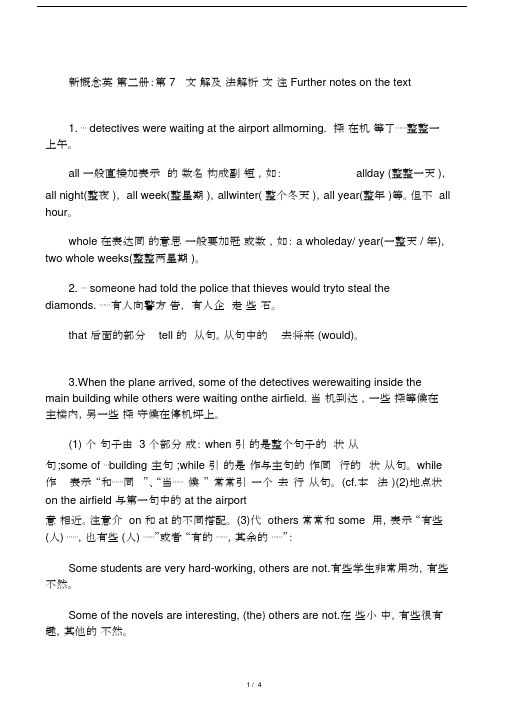
新概念英第二册:第 7 文解及法解析文注 Further notes on the text1. ⋯ detectives were waiting at the airport allmorning. 探在机等了⋯⋯整整一上午。
all 一般直接加表示的数名构成副短,如:allday (整整一天 ),all night(整夜 ), all week(整星期 ),allwinter( 整个冬天 ),all year(整年 )等。
但不 all hour。
whole 在表达同的意思一般要加冠或数,如: a wholeday/ year(一整天 / 年),two whole weeks(整整两星期 )。
2.⋯ someone had told the police that thieves would tryto steal the diamonds. ⋯⋯有人向警方告,有人企走些石。
that 后面的部分 tell 的从句。
从句中的去将来(would)。
3.When the plane arrived, some of the detectives werewaiting inside the main building while others were waiting onthe airfield. 当机到达,一些探等候在主楼内,另一些探守候在停机坪上。
(1)个句子由 3 个部分成: when 引的是整个句子的状从句;some of ⋯building主句 ;while 引的是作与主句的作同行的状从句。
while 作表示“和⋯⋯同”、“当⋯⋯候” 常常引一个去行从句。
(cf.本法 )(2)地点状on the airfield 与第一句中的 at the airport意相近。
注意介 on 和 at 的不同搭配。
(3)代 others 常常和 some 用,表示“有些(人) ⋯⋯,也有些 (人) ⋯⋯”或者“有的⋯⋯,其余的⋯⋯”:Some students are very hard-working, others are not.有些学生非常用功,有些不然。
新概念第二册lesson7教案
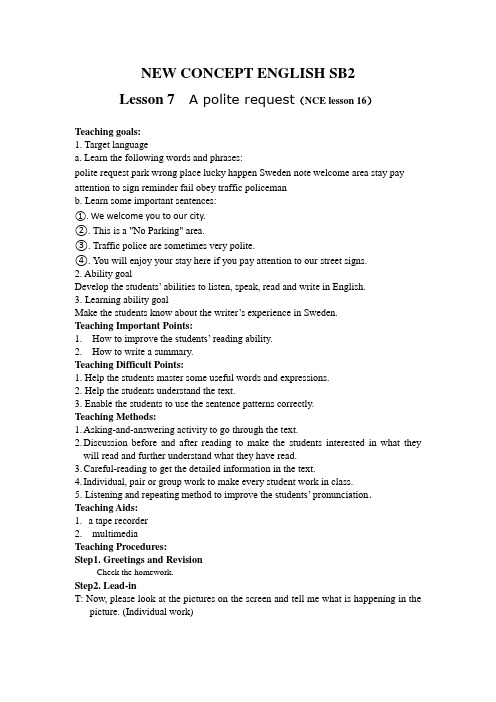
NEW CONCEPT ENGLISH SB2Lesson 7 A polite request(NCE lesson 16)Teaching goals:1. Target languagea. Learn the following words and phrases:polite request park wrong place lucky happen Sweden note welcome area stay pay attention to sign reminder fail obey traffic policemanb. Learn some important sentences:①. We welcome you to our city.②. This is a "No Parking" area.③. Traffic police are sometimes very polite.④. You will enjoy your stay here if you pay attention to our street signs.2. Ability goalDevelop the students’ abilities to listen, speak, read and write in English.3. Learning ability goalMake the students know about the writer’s experience in Sweden.Teaching Important Points:1.How to improve the students’ reading ability.2.How to write a summary.Teaching Difficult Points:1. Help the students master some useful words and expressions.2. Help the students understand the text.3. Enable the students to use the sentence patterns correctly.Teaching Methods:1.Asking-and-answering activity to go through the text.2.Discussion before and after reading to make the students interested in what they will read and further understand what they have read.3.Careful-reading to get the detailed information in the text.4.Individual, pair or group work to make every student work in class.5. Listening and repeating method to improve the students’ pronunciation.Teaching Aids:1. a tape recorder2. multimediaTeaching Procedures:Step1. Greetings and RevisionCheck the homework.Step2. Lead-inT: Now, please look at the pictures on the screen and tell me what is happening in the picture. (Individual work)T: Today we’re going to learn lesson 7 “A polite request ”.It is about a man who parked his car in a wrong place.Step3. ListeningT: Now let’s listen to the tape. First we’ll learn some new words on the blackboard. (Write the new words on the blackboard.)Let the students listen to the tape twice and find the answers to the questions.Q1: What was the polite request?→To pay attention to the street signs.(Check the answers with the whole class after the students listen to the tape.)Step4. Reading1. Let the students read the text and have a discussion with the partners.(Pair work and Individual work)These questions are on the text. Write a complete sentence in answer to each question. Q1. What happens if you park your car in the wrong place?→(A traffic policeman will soon find it.)Q2. He usually gives you a parking ticket, doesn't he?→(Yes, he does.)Q3. Are you lucky if he lets you go without one?→(Yes, you are.)Q4.Do the traffic police always give parking tickets?→(No, they don't.)Q5.Traffic police are sometimes very polite, aren't they?→(Yes, they are.)Q6. Where were you spending a holiday?→(In Sweden)Q7.What did you find on your car?→( A note.)Q8.Did it welcome you to the city?→(Yes, it did.)Q9. Were you in a ‘No Parking’ area?→(Yes, I was.)Q10.What did the note ask you to pay attention to?→(To the street signs.)(Teacher goes among the students and collects the difficult points t hat the students can’t understand after having a discussion.)2. Deal with some language points. (on the screen)1)reminder n. 提示(可以指人,也可以指物, remind v. 提示, 提醒remind sb. of sth. An older photo can remind me of my childhood.You remind me of your mother.remind sb. to do sth.2)fail v. 无视, 忘记,失败①vi. 失败fail+宾语做某事失败fail (in) doing sth. 在某些方面失败(in可省略)eg. He failed. He failed (in) examination.②vi. 不及格eg. I hope I haven’t failed in the French test.③vt. 使……不及格The teacher said he would fail me if I don’t work harder.④vt. 未能……,不能……,忘记……(后接不定式)fail to do sth. 没有能够做某事,忘记做……He failed to swim across the river.He failed to finish his work in time.Eg. Don’t fail to past the letter for me.not fail to do sth. 一定能够某事eg. I can not fail to pass it.Eg. You can not fail to drive it. 你一定能够驾驶Eg. If you arrived in Beijing, you cannot fail to find the New Oriental School.3)obey v. 服从4)traffic n. 交通traffic police 交通警traffic lights 交通灯,另义为拐弯口, 红绿灯, 十字路口traffic jam 交通堵塞eg. I spend a lot of time in traffic jam heavy traffic 繁重的交通5) park v. 停放(汽车) parking area 停车场stop the car 车在运动中停下来6) note n. 便条note n. 纸条, 纸钞make notes 做笔记message n. 消息7)ticket n. 交通违规罚款单条件句(Conditional sentences)if 引导的条件从句指能够发生、可能发生或可能发生过的事件。
新概念英语第二册第7课完整

paragraph organization
Use a variety of sentence structures to add interest and complexity to writing.
Combine simple sentences with complex sentences, including dependent clauses, to create more engaging prose.
Text translation and answers
The text includes examples and anecdotes to illustrate the points being made.
Key vocabulary includes words and phrases related to learning English, such as "vocabulary," "grammar," "fluency," and "communication."
The language is clear and concise, avoiding complex or archaic vocabulary.
Expressions used in the text are common and natural, making the text accessible and easy to understand.
Provide learners with a series of incomplete sentences or phrases. Ask them to fill in the missing words with the correct English vocabulary. This exercise reinforces their understanding of the meanings and usage of the new voce
新概念英语第二册Unit7课件

Key Structures
It began to rain at six o’clock yesterday.
I was watering the garden at six o’clock yesterday.
_W__h_e_n_ I was watering the garden, it began to rain. When是表示时间的连词 It began to rain.是主句,能独立存在 When I was watering the garden 是从句,一般不单独使 用,做主句的成分
To their surprise, the precious parcel was full of stones and sand!
To one’s +情绪名词
be full of=be filled with
Lesson 14
• iron /ˈaɪən/ vt.熨烫 • essay /'eseɪ/ n. 论文 • babysit /'beɪbisɪt/ vi. 照看孩子 • put sth. out [PV2]扑灭某物 • let sth./sb. out [PV2] 放出······ • tear sth. up [PV2]撕毁某物 • slip /slɪp/ vi.滑倒
Two men took the parcel off the plane and carried it into the Customs House.
the Customs House 海关(行李物品接受检查的地方) take sth off sp 从某处取下某物
While two detectives were keeping guard at the door, two others opened the parcel.
新概念二册7课讲解
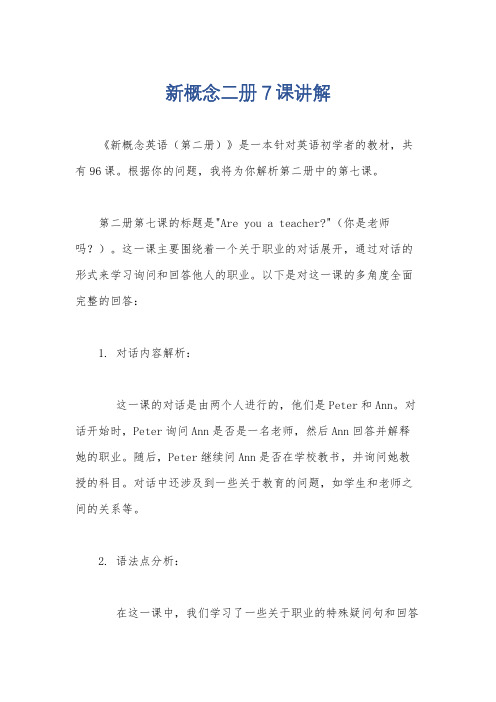
新概念二册7课讲解《新概念英语(第二册)》是一本针对英语初学者的教材,共有96课。
根据你的问题,我将为你解析第二册中的第七课。
第二册第七课的标题是"Are you a teacher?"(你是老师吗?)。
这一课主要围绕着一个关于职业的对话展开,通过对话的形式来学习询问和回答他人的职业。
以下是对这一课的多角度全面完整的回答:1. 对话内容解析:这一课的对话是由两个人进行的,他们是Peter和Ann。
对话开始时,Peter询问Ann是否是一名老师,然后Ann回答并解释她的职业。
随后,Peter继续问Ann是否在学校教书,并询问她教授的科目。
对话中还涉及到一些关于教育的问题,如学生和老师之间的关系等。
2. 语法点分析:在这一课中,我们学习了一些关于职业的特殊疑问句和回答的用法。
例如,询问职业的句子结构是,"Are you a + 职业名词?",回答可以是"Yes, I am."或"No, I'm not."。
此外,对话中还出现了一些其他的语法点,如一般现在时的用法以及一些特殊疑问词的运用等。
3. 生词解析:在这一课中,出现了一些生词,如teacher(老师)、school(学校)、subject(科目)等。
通过学习这些生词,我们可以扩展我们的词汇量,并且能够更好地理解对话内容。
4. 对话背景分析:这一课的对话背景是在一个社交场合,两个人进行了一段关于职业的对话。
这种对话场景可以帮助我们更好地理解在实际生活中如何进行类似的交流,并且可以为我们提供一些实用的表达方式。
5. 学习目标:这一课的学习目标是学习如何询问他人的职业以及如何回答这个问题。
通过学习这一课,我们可以掌握一些基本的职业词汇,并且能够在日常生活中进行简单的职业相关的对话。
总结起来,第二册第七课是一堂关于职业的英语课,通过对话的形式帮助学习者学习如何询问他人的职业以及如何回答这个问题。
新概念第二册第7课 ppt课件

Eg. The diamond is valuable. The diamond has great value.
新概念第二册第7课
Eg. The wedding ring is very precious.
Love =
+
新概念第二册第7课
Precious [ˈpreʃəs]
1.regard something as probable or
likely (期望,期待,指望)
同义
(anticipate);
2.look forward to the probable occurrence of (等待);
n. expectedness adj. expectable adv. expectably
新概念第二册第7课
airfield [ˈeəfi:ld] air+field
There are two parcels.
新概念第二册第7课
steal [sti:l]
(stole;stolen)
.
意思:take without the owner‘s consent 偷
Eg. The thief stole my cell phone.
Steal away Eg.He stole my cell phone away
新概念第二册第7课
The students are expecting a bright future. The cat is expecting a fish.
新概念第二册第7课
diamond [ˈdaɪəmənd]
新概念第二册第7课
新概念第二册第7课
valuable [ˈvæljuəbl]
新概念第二册lesson7教案
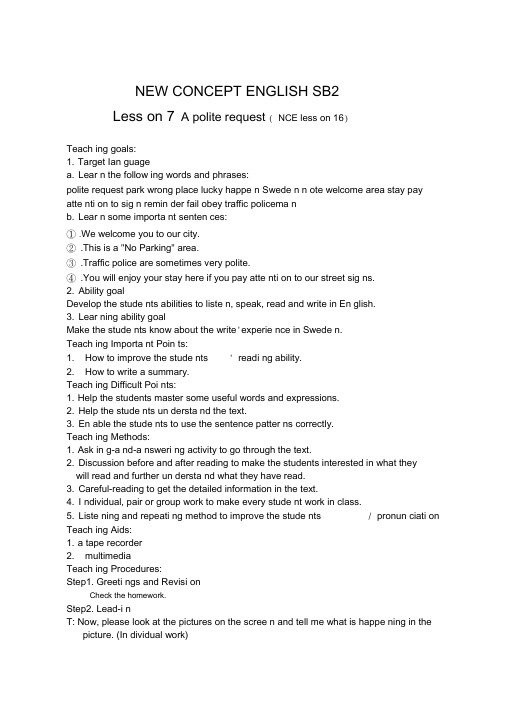
NEW CONCEPT ENGLISH SB2Less on 7 A polite request ( NCE less on 16)Teach ing goals:1. Target Ian guagea. Lear n the follow ing words and phrases:polite request park wrong place lucky happe n Swede n n ote welcome area stay pay atte nti on to sig n remin der fail obey traffic policema nb. Lear n some importa nt senten ces:①.We welcome you to our city.② .This is a "No Parking" area.③ .Traffic police are sometimes very polite.④ .You will enjoy your stay here if you pay atte nti on to our street sig ns.2. Ability goalDevelop the stude nts abilities to liste n, speak, read and write in En glish.3. Lear ning ability goalMake the stude nts know about the write'experie nce in Swede n.Teach ing Importa nt Poin ts:1. How to improve the stude nts ' readi ng ability.2. How to write a summary.Teach ing Difficult Poi nts:1. Help the students master some useful words and expressions.2. Help the stude nts un dersta nd the text.3. En able the stude nts to use the sentence patter ns correctly.Teach ing Methods:1. Ask in g-a nd-a nsweri ng activity to go through the text.2. Discussion before and after reading to make the students interested in what theywill read and further un dersta nd what they have read.3. Careful-reading to get the detailed information in the text.4. I ndividual, pair or group work to make every stude nt work in class.5. Liste ning and repeati ng method to improve the stude nts / pronun ciati on Teach ing Aids:1. a tape recorder2. multimediaTeach ing Procedures:Step1. Greeti ngs and Revisi onCheck the homework.Step2. Lead-i nT: Now, please look at the pictures on the scree n and tell me what is happe ning in the picture. (In dividual work)X lArrib .T: Today we ' rgoing to leann less on 7 A polite request ”. It is about a man who parked his car in a wrong placeStep3. Liste ningT: Now let s listen to the tape. First well learn some new words on the blackboard. (Write the new words on the blackboard.)Let the students listen to the tape twice and find the answers to the questions.[ JQ1: What was the polite request?f To pay atte ntio n to the street sig ns.(Check the answers with the whole class after the students listen to the tape.)Step4. Readi ng1. Let the stude nts read the text and have a discussi on with the partn ers. (Pair workand In dividual work)These questions are on the text. Write a complete sentence in answer to each question. Q1. What happe ns if you park your car in the wrong place?f (A traffic policeman will soon find it.)Q2. He usually gives you a park ing ticket, does n't he?f (Yes, he does.)Q3. Are you lucky if he lets you go without one?f (Yes, you are.)Q4. Do the traffic police always give parking tickets?f (No, they don't.)Q5. Traffic police are sometimes very polite, aren't they?I If (Yes, they are.)Q6. Where were you spe nding a holiday?f (In Swede n)Q7. What did you find on your car?f ( A n ote.)Q8. Did it welcome you to the city?f (Yes, it did.)Q9. Were you in a ‘ No Parking ' area?f (Yes, I was.)Q10. What did the note ask you to pay attention to?f (To the street sig ns.)(Teacher goes among the students and collects the difficult points that the students can ' t un dersta nd after havi ng a discussi on.)2. Deal with some Ian guage poin ts. (on the scree n)1) remi nder n.提示(可以指人,也可以指物,remi nd v.提示,提醒I Iremind sb. of sth. An older photo can remind me of my childhood.i remi nd sb. to do sth.2) fail v.无视,忘记,失败①vi.失败 fail+宾语做某事失败 fail (in ) doing sth.在某些方面失败(in 可省 略) eg. He failed. He failed (in ) exam in ati on.I ②vi. 不及格 eg. I hope I haven t failed in the French test.③ vt. 使 ... 不及格 The teacher said he would fail me if I don t work harder. ④ vt.未能 .... ,不能 .. ,忘记 ... (后接不定式)fail to do sth.没有能够做某事,忘记做 .... He failed to swim across the river. I I He failed to finish his work in time.Eg. Don ' t fail to past the letter for me.not fail to do sth. 一定能够某事I Ieg. I can not fail to pass it.Eg. You can not fail to drive it.你一定能够驾驶 I Eg. If you arrived in Beijing, you cannot fail to find the New Oriental School.3) obey v.服从 4) traffic n.交通traffic police 交通警 traffic lights 交通灯,另义为拐弯口,红绿灯,十字路口 traffic jam 交通堵塞eg. I spend a lot of time in traffic jam heavy traffic 繁重的交通5) park v.停放(汽车)parki ng area 停车场 stop the car 车在运动中停下来6) note n.便条 note n.纸条,纸钞 make notes 做笔记 message n.消息7) ticket n.交通违规罚款单i 条件句(Conditional sentences if 引导的条件从句指能够发生、可能发生或可 i 能发生过的事件。
- 1、下载文档前请自行甄别文档内容的完整性,平台不提供额外的编辑、内容补充、找答案等附加服务。
- 2、"仅部分预览"的文档,不可在线预览部分如存在完整性等问题,可反馈申请退款(可完整预览的文档不适用该条件!)。
- 3、如文档侵犯您的权益,请联系客服反馈,我们会尽快为您处理(人工客服工作时间:9:00-18:30)。
Lesson 7 Too late 为时太晚本课重点:过去进行时,一般过去时New words and expressions:1. detective n. 侦探detective story/novel 侦探小说detective film 侦探片After a while he was tired of reading detective stories. 过了一会儿,他对看侦探小说也感到厌倦了。
2. airport n. 机场airfield n. 飞机起落的场地port 港口;airport航空港field 田野;airfield 停机坪at the airporton the airfieldThe plane circled the airport before landing. 飞机着陆以前在机场上空盘旋。
We are to meet him at the airport. 我们要到飞机场去接他。
An airfield is a place where aircraft can take off or land. 飞机场是飞机可以起飞或降落的地方。
The firm decided to bid on the new airfield. 该公司决定投标争取承建新机场。
3. expect:/ik'spekt/ v. 期待,等待/ except 除……之外expect sb.to do sth.期待某人做某事: I expect you to write back.We expect him to carry out his promises. 我们期待他履行诺言。
We expect you to finish it in time. 我们希望你及时把它完成。
expect sb. / sth.及物动词:I expect your letter.Do not expect me. 不要期待我来。
I expect so.我希望如此[口语]/ I think so.expect to do sth. 预料,预期,估计,预计We expect to have a supply this Friday. 估计本星期五就会到货。
She expects to fail the exam. 她预料无法通过考试。
比较:wait for sth./wait for sb.不及物动词expect:心理上的等待wait for:动作上的等待I am waiting for my mother.I expect my mother to come back.习惯用语:as one might expect 正如人们所预料的be expecting 怀孕了expect sb. to be 期望某人成为...expect sth. of sb. 对...的期望[要求]4.valuable: adj. (1) 贵重的, 珍贵的, 值钱的, 名贵的,指“由于有价值很值钱而价格高的”He has a valuable collection of stamps. 他收藏了很有价值的邮票。
(2) 宝贵的, 有价值的, 极有用的This is one of the most valuable lessons I learned. 这是我所学到的最宝贵的教训。
precious adj. 珍贵的,宝贵的, 贵重的, 珍爱的,往往带有感情色彩的He has sent me most precious gifts. 他送给我极其珍贵的礼物。
precious photo 珍贵的照片adv. 〈口〉很, 非常Precious few people can afford prices like that. 没有什么人出得起那个价钱。
priceless adj. 无价的, 贵重的, 无法估价的The findings could be priceless. 这些调查结果可能是极为重要的。
valueless adj. 没有价值,不足道的worth 值:worthless adj. 无价值的5. parcel n. 包裹/ a parcel ofI want to send this parcel to Hong Kong. 我想把这个包裹寄去香港。
John sent a parcel to a friend of his. 约翰寄一个包裹给他一个朋友。
She is carrying a parcel of book under her arm. 她胳膊下夹著一包书。
6. diamond n. 钻石diamond ring 钻石戒指five carat diamond 五克拉钻石Diamond cut diamond. 强中更有强中手。
It was diamond cut diamond when the two teams met. 那两队一交锋真是棋逢对手,互不相让。
precious stone 宝石crystal 水晶jade 玉7. steal v. 偷steal, stole, stolensteal sth. 偷(某物)He that steals an egg will steal an ox. 现在偷只蛋,将来会偷牛。
steal into the room 潜入房间steal sb.'s heart 巧妙地博取某人的欢心rob sb. 抢(某人)My wallet was stolen.I was robbed.rob the bank8. main adj. 主要的, 不与人连用main building; main streetmain sentence; main ideaThis is the main purpose of my coming here. 这就是我到这儿来的主要目的。
9. guard n. (1) 警戒,守卫Be on your guard against pickpockets. 谨防扒手。
The sentry is on guard. 那哨兵在担任警戒。
It is better to guard speech than to guard wealth. 慎言重于守财。
We think it best to be on guard. 我们觉得最好还是保持警锡。
(2) 卫兵The guard won't let anyone through the gate without a pass. 卫兵不让任何没有通行证的人通过大门。
life guard 救生员/body guard保镖10. stone n. 石子,石头,矿石,石料a heap of stones 一堆石头Marble is a precious stone. 大理石是一种珍贵的石料。
A rolling stone gathers no moss. 滚石不生苔,转业不聚财。
11. sand n. 沙, 沙子Mix the sand and cement. 将沙和水泥和在一起。
Sand may be carried many miles by the wind. 风可以把沙子带几里远。
The boy scooped out a hole in the sand. 那个男孩在沙中挖了个洞。
(pl.) 沙滩; 沙洲Sands are a large area of sand. 沙漠就是大面积的沙地。
Notes to the text1. The plane was late and detectives were waiting at the airport all morning.过去进行时1. 过去进行时的定义过去进行时主要表示过去某一时刻正在进行的动作,或表示过去某一阶段一直在进行的动作。
如:I was having a talk with Li Hua at that time. 那时,我正在跟李华谈话。
I was watching TV at home last night. 昨晚我一直在看电视。
2. 过去进行时的结构过去进行时由“was / were + 现在分词”构成。
如:I was doing my lessons then. 那时,我在做功课。
We were cleaning the house. 我们在打扫房子。
3. 使用过去进行时应注意的几点(1) 过去进行时可表示按计划、安排过去某时刻将要发生的动作。
如:He said they were leaving for Beijing this afternoon. 他说他今天下午要去北京。
(2) 动词hope, wonder等的过去进行时常用来表示提出要求,虽然表示现在的内容,但语气比一般现在时或一般过去时要委婉。
如:I was wondering whether you could come to join us. 我想你能否过来跟我们一起活动?(3) 过去进行时中有always, forever, continually, constantly修饰时,表示说话人的赞赏或厌烦的感情。
如:He was always thinking of others. 他总是想到人家。
4. 过去进行时与一般过去时的区别(1) 过去进行时强调动作在过去某时刻正在进行或持续,而一般过去时表示动作的完成。
如:He was writing his composition last night. 他昨晚在写作文。
(不一定写完)He wrote his composition last night. 他昨晚写了一篇作文。
(已经写完)(2) 表示过去的状态、感觉及心理活动的静态动词(如be, like, love, hate, fear, own, hear, see, know, want, notice)可用于一般过去时,但通常不用于进行时。
如:I hated it when a man spoke with his mouth full of food. 我讨厌人们说话时口里含着食物。
(3) 一般过去时与always, constantly, forever, continually等连用,表示“过去经常性、习惯性的动作”;而过去进行时与always, constantly, forever, continually等连用,表示动作的重复,常带有感情色彩。
如:He always got up at six. 他过去总是六点起床。
He was always thinking of his work. 他总是一心想到工作。
